#sharecropper's son
Explore tagged Tumblr posts
Text
Robert Finley Interview: Something to Laugh About

BY JORDAN MAINZER
The most stunning and heartbreaking song on blues singer Robert Finley's latest album Black Bayou (Easy Eye Sound), is made up. On album closer "Alligator Bait", the narrator--at first talking rather than singing--describes trudging through the swamp, his grandfather having just purchased for him a pair of hip boots. Backed by Kenny Brown's spindly guitars, Eric Deaton's slinky bass, and Jeffrey Clemens' slow-burning, stomping drums, Finley's gruff voice tells the story of this character wading around, waiting for something to happen. He accidentally steps on an alligator's back, thinking it's a log; his grandfather shoots the gator after it reacts. Matter-of-fact, Finley states, darkly humorous, "A lotta kids got ate like that." But on the second half of the song, he sings, wailing like a bluesman who had his heart broken. Only this time, he's taken aback by familial betrayal, realizing his grandfather had only bought him the hip boots and told him to enter the swamp in order to use him as alligator bait. When the narrator goes home to tell his father, his father laughs and brushes him aside, confessing that the same thing happened to him when he was a kid. Most of us face a mini existential crisis when we learn our parents aren't perfect. The narrator of "Alligator Bait", on the other hand, has just learned of his own dispensability.
When I spoke to Finley over the phone a few days before Black Bayou was released in late October, he confessed, "'Alligator Bait' was supposed to be cheerful. I didn't want to make him look like a mean old grandpa. It's just something to laugh about," before pausing and adding, "Maybe it'll make some kids stay away from the creek." Indeed, seven years into his improbable comeback, Finley views his role as a singer and entertainer as twofold: meeting the audience at the heart while simultaneously giving them advice, telling them the barebones truth when other authority figures won't. On Black Bayou, he reckons with ideas of homesickness and loneliness, lust and love, selflessness and salvation. Buoyed by longtime collaborator Dan Auerbach of The Black Keys, Finley wrote all of the songs in the studio, and his familiarity with his supporting cast of musicians resulted in songs that were both efficiently recorded and emotionally acute. Brown's guitar winces with longing on "Livin' Out A Suitcase" as Finley's tired of traveling. On "Waste Of Time", a song that sees Finley taking pride in rural living even if it means missing out on opportunities provided by cities, the buzz-saw guitars and Clemens' clattering percussion yield a perfect maximalism to go along with Finley's claims that, yes, there's still a lot to digest right outside your doorstep. "There are so many guys down here with super talent," Finely said. "They haven't been exposed to the right places."
In fact, Finley's daughter and grandaughter, Christy Johnson and LaQuindrelyn McMahon, offer a prototype. Like many musicians and singers in rural Louisiana, Johnson had long been singing at church, specifically in the youth choir before she started traveling with her father, joining him on his 2019 America's Got Talent stint and eventually recording background vocals on 2021's autobiographical Sharecropper's Son. And Finley insisted to Auerbach on McMahon singing backup on Black Bayou, though she's also in her own band, according to Finley. After all, there's not much of a difference between blues and gospel music. As Finley puts it, it's just "Oh, baby!" versus "Oh, lord!"
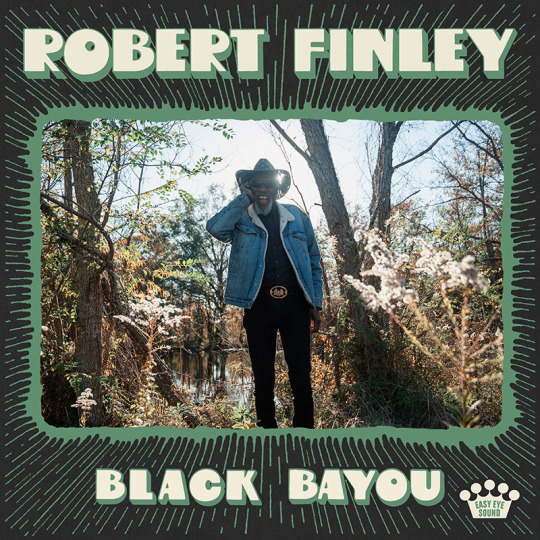
Really, Finley feels his songs could essentially soundtrack various milestones or important events in life. He made sweet doo wop outlier "Lucky Day" for others. "It's a wedding song. It's for people celebrating their 50th anniversary," he said. "It's one of those songs you can use in different situations." In contrast, he describes "Susie Q"-esque lurker "What Goes Around Comes Around" as "basically scripture," even as he sings lines like, "I got my whiskey and my woman / I ain't worried about a thing." Living the way you want and keeping to yourself can be a holy exercise, too. "They're the true facts. No sugarcoating," Finley said, adding, "Something the preacher ain't gonna say. They'd kick him out the church!"
The line between Finley's performance as authentic versus an act is not one he's really ultimately concerned with, as the very fact that he's gotten here is surreal. "I'm living my childhood dream at my age," he said. "I get a chance to express myself. To be able to go back and look at myself on film to see how I've made a fool of myself." Multiple times throughout our conversation, he referred to himself as in total service of the audience, wanting to make them laugh, wanting to make their lives easier, even if he needs to paint himself as a sinner or dunce in order to do so. Still, he has his head on his shoulders. "There's a difference between acting a fool and being a fool," Finley said. "One means you're a really good actor because you can act crazy, and the other says, 'You're fucking crazy for real.'" Find me a preacher who'd admit that!
youtube
#interviews#robert finley#black bayou#easy eye sound#kenny brown#eric deaton#jeffrey clemens#dan auerbach#the black keys#christy johnson#laquindrelyn mcmahon#america's got talent#sharecropper's son
0 notes
Text
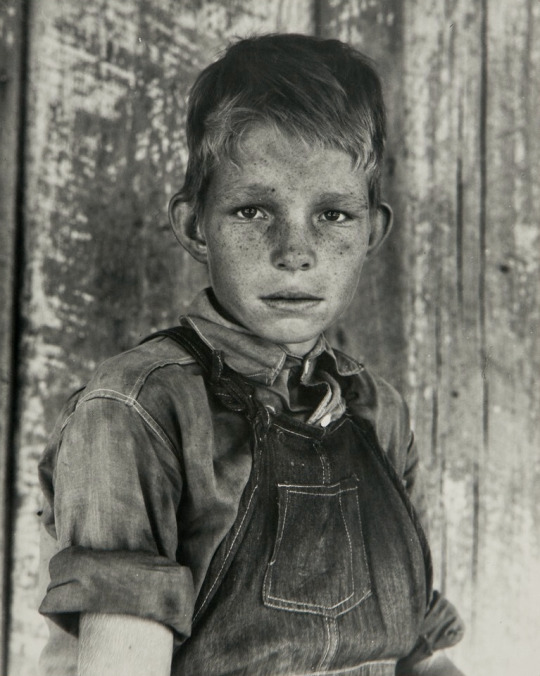
Twelve-year-old son of a cotton sharecropper near Cleveland, Mississippi, 1937 - Dorothea Lange (1895 – 1965), American
138 notes
·
View notes
Text
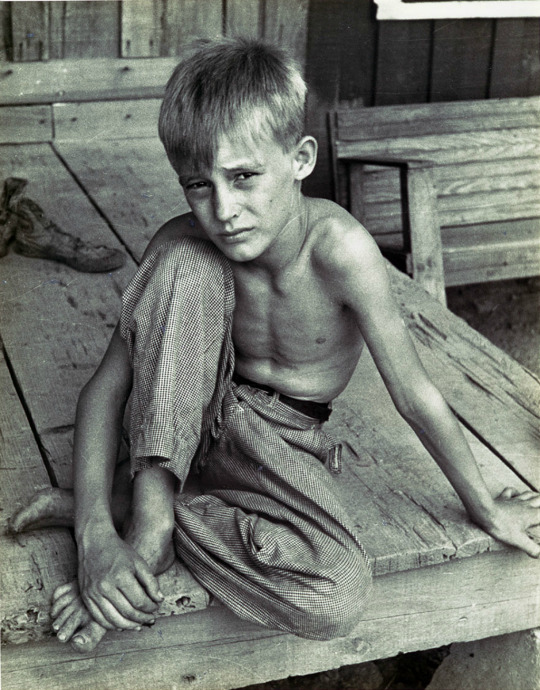
Son of Sharecropper. Mississippi Country, Arkansas. 1935
Photo: Arthur Rothstein- Library of Congress
44 notes
·
View notes
Text
New Video: JOVM Mainstay Robert Finley Shares Slow-Burning Ballad "Nobody Wants To Be Lonely"
New Video: JOVM Mainstay Robert Finley Shares Slow-Burning Ballad "Nobody Wants To Be Lonely" @therobertfinley @easyeyesound @Bigfeatpr @danauerbach
69 year-old Winnsboro, LA-born, Bernice, LA-based singer/songwriter and JOVM mainstay Robert Finley‘s highly-anticipated fourth album, Black Bayou is slated for an October 27, 2023 release through Easy Eye Sound. Black Bayou sees the JOVM mainstay continuing his wildly successful collaboration with Dan Auerbach. Much like its immediate predecessor, the new album’s material is a deeply personal…

View On WordPress
#Bernice LA#Black Keys#Easy Eye Sound#G. Love & Special Sauce#music#music video#Nashville TN#New Video#Patrick Carney#Robert Finley Black Bayou#Robert Finley Nobody Wants To Be Lonely#Robert Finley Sharecropper&039;s Son LP#Robert Finley Sneakin&039; Around#Robert Finley What Goes Around (Comes Around)#singer/songwriter \#soul#Tim Hardiman#video#Video Review#Video Review: Nobody Wants To Be Friendly#Video Review: Robert Finley Nobody Wants To Be Friendly#Winsboro LA
4 notes
·
View notes
Text
Terry Blade presents Ethos: Son of a Sharecropper.
Award-winning Chicago singer-songwriter Terry Blade has recently released a new album featuring blues, folk, and Americana influences. The release, titled "Ethos: Son Of A Sharecropper," is a heartfelt tribute to the roots of American music. It celebrates the stories, values, and traditions of all the people who contributed to the creation of this timeless musical heritage. The American music scene is a melting pot of European, Caribbean, and African influences that came together to define the next three centuries of global music culture, and the pivotal role of Black music in all of this cannot be overstated.
With this album, Terry Blade is sending a very powerful message: it's important to look back at one's roots and be continually open to new ideas. This is particularly significant, given that Terry comes from a different background. As a multi-genre artist, he has explored many styles, and American Roots music feels like a new direction. The artist's vision was to showcase the role of black music in the context of traditional Americana. As mentioned earlier, black music isn't just another piece of an intricate mosaic. It is perhaps the pivotal component - the spirit that holds it all together and gives it a unique essence, which has been enduring for decades.
As an openly queer African American, Terry also takes the opportunity to look back on his ancestral past. He is a descendant of sharecroppers, and his overall work and personal serve as a testament to how far we've come since those hard times when slaves worked for no wages and had barely any rights. Still, Terry felt that this was an important story to tell and that, in spite of the hard times, this album was a powerful reminder of how the sheer power of music kept the souls of those people alive. No matter how long and hard the work days and nights were. No matter how little they had to their name. They still had a powerful bridge with their ancestral land through the power of music. This power was so strong that it endures to this very day.
Terry possesses a powerful and emotive voice that resonates with deep soulfulness and raw emotion, making it a perfect vehicle to convey the deeper meaning behind this album.
Musically, the album embraces a very organic, earthy sound, which is in line with the concept of this release. Yet, the production is incredibly immersive and crisp, reminiscent of modern greats such as T-Bone Burnett in the way these classic musical styles are given a fresh and pristine sound without compromising their warmth.
Comparisons with greats such as Lead Belly and Son House come to mind, but Terry's ability to embrace Americana is quite impressive, especially considering he considers himself quite a newcomer to the genre.
This release offers many fantastic highlights, as its ten songs do cover a lot of ground. The second track, in particular, "Won't Be Around," offers a slow-moving yet intense groove with a sultry guitar rhythm accented by a sparse tambourine and piano chords. The song allows Terry to showcase his vocal range and power in full force. The song "Rigor Mortis" is another stand-out track. The acoustic guitars are mesmerizing, with crystalline arpeggios and stomping rhythms adding to the evocative nature of the arrangement. Terry's layered vocals are impressive, especially his ability to stack harmonies and create a wall of sound with his voice.
On moments like "Fiddle & Banjo," Terry decided to highlight the storytelling component of this album, making for an immersive, very cinematic twist.
The song's closing tune, "In My House," embraces Chicago-style blues influences, and Terry's vocal performance on this song is nothing short of breath-taking, reminiscent of icons such as Solomon Burke or John Lee Hooker, just to mention a few. While the piano has a classic blues feel, the slide guitar has the attack and brightness typical of country music, bringing more ambiance and texture to the piece.

Ultimately, "Ethos: Son of a Sharecropper" is more than just a musical album. It is an important document. A collection of oral histories and an important way to remind ourselves that sometimes, the best way to move forward is actually to remember the past and learn lessons from it. For this reason, "Ethos: Son of a Sharecropper" is like a beacon of light, a very powerful and uplifting piece of music that is personal, yet universally appealing. Whether it was joy, sorrow, longing, or spiritual fervor, this beautiful, full-length album captures the feelings of many generations of African Americans and beyond. Anyone can easily relate to these touching songs and stories, regardless of their roots and backgrounds. This is because Terry has a way of using his musical talent to carry the weight of his life experiences and connect with people through his humanity and journey.
It is not surprising that this record is already making waves. It earned the artist a Gold Medal Award for Americana at the Global Music Awards, not only because of Terry's musical talent but also because of the thoughtfulness and insights driving his concept.
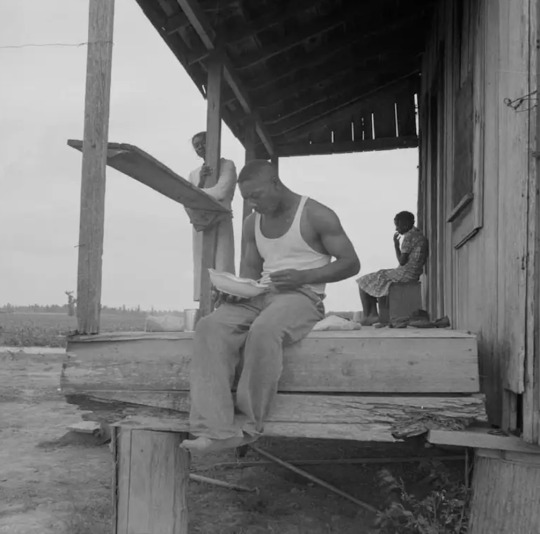
#terry blade#ethos#son of a sharecropper#americana#queer country#country#country music#folk#indie folk#american music#roots music#Spotify
0 notes
Text
A long road took nine children out of the cotton fields, out of poverty, out of Mississippi. But roads go both ways, and this Thanksgiving weekend, they all returned. This is about Thanksgiving, and coming home.
“There’s my daddy,” says Gloria Chandler Coleman, master of arts, University of Missouri, a teacher in Kansas City. All nine children had memories of a sharecropper’s cabin and nothing to wear and nothing to eat. All nine are college graduates. Cooking the meal in the kitchen of the new house the children built for their parents four years ago is Bessie Chandler Beasley, BA Tuskegee, MA Central Michigan, dietician at a veterans hospital, married to a PhD. And helping out, Princess Chandler Norman, MA Indiana University, a schoolteacher in Gary, Indiana.
Alex Chandler remembers the time when he had a horse and a cow and tried to buy a mule and couldn’t make the payments and lost the mule, the horse, and the cow. And about that time, Cleveland, the first son, decided he wanted to go to college. “We didn’t have any money,” says Alex. “And we went to town; he wanted to catch the bus to go on up there. And so we went to town and borrowed two dollars and a half from her niece, and bought him a bus ticket. And when he got there, that’s all he had.”
From that beginning, he became Dr. Cleveland Chandler. He is chairman of the economics department at Howard University. How did they do it, starting on one of the poorest farms in the poorest part of the poorest state in America? “We worked,” says Princess Chandler Norman.
Source: WAFB 9 @theblackdetournews
@sooooooomississippi
#black history#black people#black family#black excellence#blacklivesmatter#black lives matter#instagram#racial injustice#survival#black empowerment#black liberation
200 notes
·
View notes
Text

FATHER & SON: James Earl Jones with his Father Robert Earl Jones on Stage in the 1962 Production "Moon on a Rainbow Shawl."
Robert Earl Jones (February 3, 1910 – September 7, 2006), sometimes credited as Earl Jones, was an American actor and professional boxer. One of the first prominent Black film stars, Jones was a living link with the Harlem Renaissance of the 1920s and 1930s, having worked with Langston Hughes early in his career.
Jones was best known for his leading roles in films such as Lying Lips (1939) and later in his career for supporting roles in films such as The Sting (1973), Trading Places (1983), The Cotton Club (1984), and Witness (1985).
Jones was born in northwestern Mississippi; the specific location is unclear as some sources indicate Senatobia, while others suggest nearby Coldwater. He left school at an early age to work as a sharecropper to help his family. He later became a prizefighter. Under the name "Battling Bill Stovall", he was a sparring partner of Joe Louis.
Jones became interested in theater after he moved to Chicago, as one of the thousands leaving the South in the Great Migration. He moved on to New York by the 1930s. He worked with young people in the Works Progress Administration, the largest New Deal agency, through which he met Langston Hughes, a young poet and playwright. Hughes cast him in his 1938 play, Don't You Want to Be Free?.
Jones also entered the film business, appearing in more than twenty films. His film career started with the leading role of a detective in the 1939 race film Lying Lips, written and directed by Oscar Micheaux, and Jones made his next screen appearance in Micheaux's The Notorious Elinor Lee (1940). Jones acted mostly in crime movies and dramas after that, with such highlights as Wild River (1960) and One Potato, Two Potato (1964). In the Oscar-winning 1973 film The Sting, he played Luther Coleman, an aging grifter whose con is requited with murder leading to the eponymous "sting". In the later 20th century, Jones appeared in several other noted films: Trading Places (1983) and Witness (1985).
Toward the end of his life, Jones was noted for his stage portrayal of Creon in The Gospel at Colonus (1988), a black musical version of the Oedipus legend. He also appeared in episodes of the long-running TV shows Lou Grant and Kojak. One of his last stage roles was in a 1991 Broadway production of Mule Bone by Hughes and Zora Neale Hurston, another important writer of the Harlem Renaissance. His last film was Rain Without Thunder (1993).
Although blacklisted by the House Un-American Activities Committee in the 1950s due to involvement with leftist groups, Jones was ultimately honored with a lifetime achievement award by the U.S. National Black Theatre Festival.
Jones was married three times. As a young man, he married Ruth Connolly (died 1986) in 1929; they had a son, James Earl Jones. Jones and Connolly separated before James was born in 1931, and the couple divorced in 1933. Jones did not come to know his son until the mid-1950s. He adopted a second son, Matthew Earl Jones. Jones died on September 7, 2006, in Englewood, New Jersey, from natural causes at age 96.
THEATRE
1945 The Hasty Heart (Blossom) Hudson Theatre, Broadway
1945 Strange Fruit (Henry) McIntosh NY theater production
1948 Volpone (Commendatori) City Center
1948 Set My People Free (Ned Bennett) Hudson Theatre, Broadway
1949 Caesar and Cleopatra (Nubian Slave) National Theatre, Broadway
1952 Fancy Meeting You Again (Second Nubian) Royale Theatre, Broadway
1956 Mister Johnson (Moma) Martin Beck Theater, Broadway
1962 Infidel Caesar (Soldier) Music Box Theater, Broadway
1962 The Moon Besieged (Shields Green) Lyceum Theatre, Broadway
1962 Moon on a Rainbow Shawl (Charlie Adams) East 11th Street Theatre, New York
1968 More Stately Mansions (Cato) Broadhurst Theatre, Broadway
1975 All God's Chillun Got Wings (Street Person) Circle in the Square Theatre, Broadway
1975 Death of a Salesman (Charley)
1977 Unexpected Guests (Man) Little Theatre, Broadway
1988 The Gospel at Colonus (Creon) Lunt-Fontanne Theatre, Broadway
1991 Mule Bone (Willie Lewis) Ethel Barrymore Theatre, Broadway
FILMS
1939 Lying Lips (Detective Wenzer )
1940 The Notorious Elinor Lee (Benny Blue)
1959 Odds Against Tomorrow (Club Employee uncredited)
1960 Wild River (Sam Johnson uncredited)
1960 The Secret of the Purple Reef (Tobias)
1964 Terror in the City (Farmer)
1964 One Potato, Two Potato (William Richards)
1968 Hang 'Em High
1971 Mississippi Summer (Performer)
1973 The Sting (Luther Coleman)
1974 Cockfighter (Buford)
1977 Proof of the Man (Wilshire Hayward )
1982 Cold River (The Trapper)
1983 Trading Places (Attendant)
1983 Sleepaway Camp (Ben)
1984 The Cotton Club (Stage Door Joe)
1984 Billions for Boris (Grandaddy)
1985 Witness (Custodian)
1988 Starlight: A Musical Movie (Joe)
1990 Maniac Cop 2 (Harry)
1993 Rain Without Thunder (Old Lawyer)
TELEVISION
1964 The Defenders (Joe Dean) Episode: The Brother Killers
1976 Kojak (Judge) Episode: Where to Go if you Have Nowhere to Go?
1977 The Displaced Person (Astor) Television movie
1978 Lou Grant (Earl Humphrey) Episode: Renewal
1979 Jennifer's Journey (Reuven )Television movie
1980 Oye Ollie (Performer) Television series
1981 The Sophisticated Gents (Big Ralph Joplin) 3 episodes
1982 One Life to Live
1985 Great Performances (Creon) Episode: The Gospel at Colonus
1990 True Blue (Performer) Episode: Blue Monday
#james earl jones#black tumblr#black literature#black community#black excellence#blackexcellence365#actor#robert earl jones#stage actor
326 notes
·
View notes
Text

This gentleman came up through the ranks the hard way ...
From a sharecropper's son to Supreme Court Justice ...
In spite of the Nazicrats' best efforts to smear him and keep him off the bench ...
May GOD bless you Justice Thomas ...
192 notes
·
View notes
Note
Please go read or listen to Paul Robeson's testimony before HUAC.
Transcript: https://historymatters.gmu.edu/d/6440BA
Audio reenactment by James Earl Jones: https://www.youtube.com/watch?v=VhnCrHZkgNk
My name is Paul Robeson, and anything I have to say, or stand for, I have said in public all over the world, and that is why I am here today.
...
Mr. SCHERER: Mr. Chairman, this is not a laughing matter.
Mr. ROBESON: It is a laughing matter to me, this is really complete nonsense.
...
Mr. SCHERER: The witness talks very loud when he makes a speech, but when he invokes the Fifth Amendment I cannot hear him.
Mr. ROBESON: I invoked the Fifth Amendment very loudly. You know I am an actor, and I have medals for diction.
...
Mr. ROBESON: Because my father was a slave, and my people died to build this country, and I am going to stay here, and have a part of it just like you. And no Fascist-minded people will drive me from it. Is that clear? I am for peace with the Soviet Union, and I am for peace with China, and I am not for peace or friendship with the Fascist Franco, and I am not for peace with Fascist Nazi Germans. I am for peace with decent people.
Mr. SCHERER: You are here because you are promoting the Communist cause.
Mr. ROBESON: I am here because I am opposing the neo-Fascist cause which I see arising in these committees. You are like the Alien [and] Sedition Act, and Jefferson could be sitting here, and Frederick Douglass could be sitting here, and Eugene Debs could be here.
...
THE CHAIRMAN: There was no prejudice against you. Why did you not send your son to Rutgers?
Mr. ROBESON: Just a moment. This is something that I challenge very deeply, and very sincerely: that the success of a few Negroes, including myself or Jackie Robinson can make up—and here is a study from Columbia University—for seven hundred dollars a year for thousands of Negro families in the South. My father was a slave, and I have cousins who are sharecroppers, and I do not see my success in terms of myself.
youtube
Paul Robeson vs Gregory Peck
191 notes
·
View notes
Text
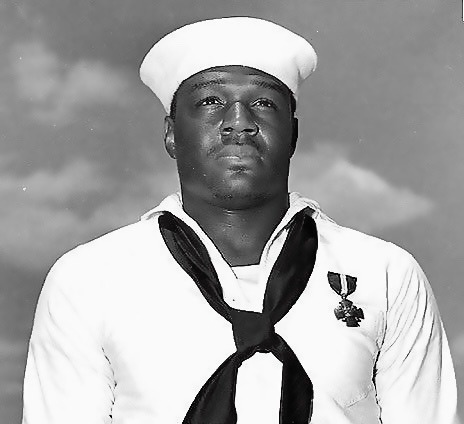
Today In History
Doris Miller, African-American hero of World War II, the son of sharecroppers Connery and Henrietta Miller, enlisted in the United States Navy at its Dallas recruiting station.
Following bootcamp training in Norfolk, Virginia, he was assigned to the USS West Virginia as a messman.
On December 7, 1941, Mess Attendant Second Class Doris Miller was collecting soiled laundry just before 8:00 A.M. when the first bombs blasted his ship at anchor in Pearl Harbor. Miller went to the main deck where he assisted in moving the mortally wounded captain.
He then raced to an unattended deck gun and fired at the attacking planes until forced to abandon ship. It was Miller’s first experience firing such a weapon because black sailors serving in the segregated steward’s branch of the Navy were not given the gunnery training received by white sailors.
Navy officials conferred the Navy Cross upon Miller on May 27, 1942, in a ceremony at Pearl Harbor.
In addition to conferring upon him the Navy Cross, the Navy honored Doris Miller by naming a dining hall, a barracks, and a destroyer escort for him. The USS Miller is the third naval ship to be named after a black Navy man.
In Waco a YMCA branch, a park, and a cemetery bear his name. In Houston, Texas, and in Philadelphia, Pennsylvania, elementary schools have been named for him, as has a Veterans of Foreign Wars chapter in Los Angeles. An auditorium on the campus of Huston-Tillotson College in Austin is dedicated to his memory. In Chicago the Doris Miller Foundation honors persons who make significant contributions to racial understanding.
CARTER™️ Magazine
#carter magazine#carter#historyandhiphop365#wherehistoryandhiphopmeet#history#cartermagazine#today in history#staywoke#blackhistory#blackhistorymonth#doris miller
195 notes
·
View notes
Text













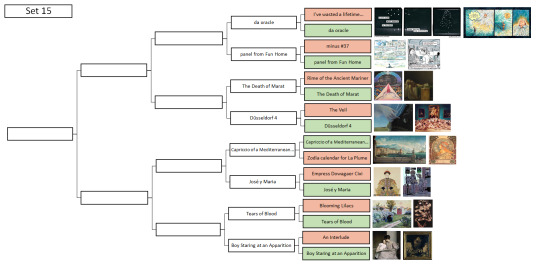


Behold, a bracket!
Text form below the cut because trying to copy all the 256 into the alt text sounded.... horrifying. Warning for 128 matchups, seriously, this list is long, and so I've avoided adding the artists until the polls.
a note: the pinned post has started misbehaving, so only open polls will be directly linked. closed polls instead have the results page linked in the set header, all the polls are linked from there
Set 1
The Lament for Icarus (Miao He) vs The Lament for Icarus (Herbert Draper)
The angel came to me in a fever hallucination, perched upon my bed as I returned from the bathroom. vs Sweet Brown Snail
Figures vs A Philosopher Lecturing on the Orrery
Happy Shoppers vs Hubble Deep Field
Lovers Painting vs Bath Curtain
Dr. Helen Taussig vs Une Martyre
Orangoutang étranglant un sauvage de Bornéo (Orangutan strangling a Borneo savage) vs Can’t Help Myself
Rape vs Technicolor Hiroshima
Set 2
A Walk at Dusk vs Based on “Autoportrait with the Model” by Maria-Rayevska Ivanova
Diary Page vs Les Jours Gigantesques (The Titanic Days)
Dead of Night vs You Won't
Christina's World vs Bobby
Untitled (I’m Turning Into A Specter Before Your Very Eyes And I’m Going To Haunt You) vs Two Sisters (On the Terrace)
Sharecropper vs Lustmord
The Parca and the Angel of Death vs Untitled (Zdzisław Beksiński)
Stress vs The Fallen Angel
Set 3
Device to Root Out Evil vs Travelling Light
Diana vs Fifty Days at Iliam: The Fire that Consumes All before It
The Plains, from Memory vs Exotic Bodies
Doubting Thomas vs Self-Portrait in the Bathroom Mirror
Empty Nest vs Somebody Fell From Aloft
Anguish vs If I Died
Cat in Obsolete Bath vs You're Not Boring Anymore
Salvator Mundi (Savior of the World) vs Untitled (billboard of an empty unmade bed)
Set 4
There Will Be No Miracles Here vs Symphony of the Sixth Blast Furnace
Fox Hunt vs Tarpaulin
Khajuraho Group of Monuments vs Ranakpur Jain Temple
ปราสาทสัจธรรม (The Sanctuary of Truth) vs Grande Panorama de Lisboa
Heroic Head of Pierre de Wissant, One of the Burghers of Calais vs The Weather
The Daughters of Edward Darley Boit vs If this is art
Statue of Vincent and Theo van Gogh vs Jeanne d’Arc écoutant les voix (Joan of Arc listening to the Voices)
Fountain vs Judith Slaying Holofernes
Set 5
Cueva de las Manos (Cave of Hands) vs Cave of El Castillo
Chauvet Cave Bear vs Uffington White Horse
Laocoön and His Sons vs Winged Victory of Samothrace
Crouching Aphrodite vs Statue of Taweret
Guardian Figure vs Kūya-Shonin (Saint Kuya)
Ancient Greek doll vs Arena #7 (Bears)
Enbu (炎舞) (Dancing in the Flames) vs Yearning Shadows
Belfast to Byzantium vs Freedom
Set 6
The Kama Sutra of Vatsyayan vs Portraits
The Blood Mirror vs Nighthawks
Electric Fan (Feel it Motherfuckers): Only Unclaimed Item from the Stephen Earabino Estate vs "Untitled" (Portrait of Ross in L.A.)
Lady Agnew of Lochnaw vs Forgotten Dreams
Saint Bride vs Pixeles (a group of 9 works)
War Pieta vs The Sunset
The Handmaidens of Sivawara Preparing the Sacred Bull at Tanjore for a Festival vs Ajax and Cassandra
Nāve (Death) vs Abstraction
Set 7
Yes vs Meeting on the Turret Stair
Hacked to Death II vs Stańczyk
Closeness Lines Over Time vs Voice of Fire
The Maple Trees at Mama, the Tekona Shrine and Tsugihashi Bridge vs Portrait of Sir Thomas More
Survival Series: In a Dream You Saw a Way vs Takiyasha the Witch and the Skeleton Spectre
Death blowing bubbles vs The Kitchen Table Series
Painting 1946 vs In the Grip of Winter
Untitled (Black and Gray) vs NAMES Project AIDS Memorial Quilt
Set 8
Blue Plate Special vs Red Cedar
Palace of Fine Arts vs Mosque–Cathedral of Córdoba
Le Château des Pyrénées (The Castle of the Pyrenees) vs Susanna and the Elders, Restored - X-Ray
Moby Dick vs Viva la Vida, Watermelons
Venus Envy Chapter One (Of the First Holy Communion Moments Before the End) vs how to look at art
St. Sebastian vs Untitled #12
Carroña vs The invincible one
Untitled (Two Dogs) vs The Dog
SECOND HALF
Set 9
David (Donatello) vs David (Michelangelo)
The Other Side vs The Temptation of St. Jerome
Seated Woman with Bent Knees vs Starry Night
Headdress - Shadae vs Untitled for the Image Flow's Queer Conscience exhibit
Woman with Dead Child (Frau mit totem Kind) vs Les Amants (The Lovers)
Siroče na majčinom grobu (Orphan on Mother's Grave) vs You Make My World a Better Place to Find
Fighting Against SARS Memorial Architectural Scene (弘揚抗疫精神建築景觀) vs Fallingwater
Resting vs The Hull
Set 10
Olive Trees vs Worship
Glow vs Wheatfield with Crows
Study after Velázquez's Portrait of Pope Innocent X vs Untitled (He Plays Very Badly)
D.I.Y. by John Wiswell vs The Tragedy
Judith and the Head of Holofernes vs Beethovenfries (Beethoven Frieze)
The Memory of Me (How Could I Forget) vs oh god i had a really big epiphany about love and personhood but i’m too drunk for words
I am happy because everyone loves me vs 瀕危形態 (Endangered Forms)
Three Scaffolders vs Ivan the Terrible and His Son Ivan
Set 11
San Giorgio Maggiore at Dusk vs Water-Lilies, Reflection of a Weeping Willow
The Grief of the Pasha vs Monolith in Vigeland Sculpture Park
Passion vs Space Diner
Hamlet and Ophelia vs Two Earthlings
Ellen Terry as Lady Macbeth vs Seer Bonnets
Photograph from "SNAP OSAKA" Collection vs Clytemnestra after the Murder
“Untitled” (Perfect Lovers) vs The Lovers (TIE)
Kedai Ubat Jenun vs Orange Store Front
Set 12
The Apotheosis of War vs Portrait of the Dancer Aleksandr Sakharov
Julie Manet vs Mouth
The Icebergs vs Kaleidoscope Cats III
Maman vs Caza Nocturna (Night Hunt)
The Book of Kells Folio 188r: Luke carpet page vs Ardagh Chalice
Yusuf and Zulaikha vs Dome of the Rock mosaics
Rowan Leaves and Hole vs Untitled (prisonhannibal)
Le Désespéré (The Desperate Man) vs The Dedication
Set 13
Deimos vs Dog and Bridge
The Mocking of Christ vs Prudence
The Broken Column vs Siberian Ice Maiden shoulder tattoo
Transi de René de Chalon (Cadaver Tomb of René of Chalon) vs Head of Christ
The Day vs Spirit of Haida Gwaii
Eleanor Boathouse at Park 571 vs Jatiya Sangsad Bhaban জাতীয় সংসদ ভবন (National Parliament House)
Juventud de Baco (Bacchus Youth) vs Barges on the Seine
Oath of the Horattii closeup vs Visit hos Excentrisk Dam (Visit to an eccentric lady)
Set 14
Christ Crucified (With Donor) vs St. Francis
Thunder Raining Poison vs Piazza d'Italia
The Grove vs Among the Waves
Pintura Mural de Alarcón vs Sagrada Família stained-glass windows
Noonday Heat vs La Dame à la licorne (The Lady and The Unicorn)
Matroser i Gröna Lund (Sailors in Gröna Lund) vs Gielda Plakatu
Reply of the Zaporozhian Cossacks vs The Garden of Earthly Delights
Kuoleman puutarha (The Garden of Death) vs Haavoittunut enkeli (The Wounded Angel)
Set 15
i've wasted a lifetime pretending to be me vs da oracle
minus #37 vs Panel from Fun Home
Excerpt from illustrated edition of The Rime of the Ancient Mariner vs La Mort de Marat (The Death of Marat)
The Veil vs Düsseldorf 4 (Museum Kunst Palast)
Capriccio vs Zodiac calendar for La Plume
The official imperial portrait of empress dowager Cixi vs José y Maria
Blooming Lilacs vs Lágrimas De Sangre (Tears of Blood)
An Interlude vs Boy Staring at an Apparition
Set 16
Mermer Waiskeder: Stories of the Moving Tide vs The Gran Hotel Ciudad de México Art Nouveau interior
Unfinished Painting vs To Arms!
Memorial to a Marriage vs The Island
Dropping a Han Dynasty Urn vs A Few Small Nips
Saturn Devouring His Son vs Guernica
Fairy Princesses vs Lamentation over the Dead Christ
Mummy with An Inserted Panel Portrait of a Youth vs Little Girl Looking Downstairs at Christmas Party
Agnus vs The Cup Of His Murders Is Flowing Over And In His Coat Shall Be Many Curses
251 notes
·
View notes
Text

Medal of Honor Monday: Roy Benavidez
On this day in 1981, a member of the United States Army Special Forces receives the Medal of Honor. Surely no one had expected the orphaned son of Texas sharecroppers to one day earn such an honor?
Yet Master Sergeant Roy P. Benavidez did exactly that.
The story of his heroic action sounds a bit like a scene from a Hollywood movie. Indeed, as he awarded the Medal, Ronald Reagan reportedly noted that “you wouldn’t believe” Benavidez’s story because it sounds too much like a movie script.
On May 2, 1968, Benavidez was at a forward operating base in Vietnam. A twelve-member Special Forces team was then operating just west of Loc Ninh. Unfortunately, they were discovered and came under heavy fire. Three helicopters were dispatched to extract the team, but they were forced to turn back because of intense small arms and antiaircraft fire. A second rescue attempt was mounted. Benavidez volunteered for the mission.
FULL STORY: https://www.taraross.com/post/tdih-roy-benavidez-moh
14 notes
·
View notes
Text
John Lee Hooker.... the son of a sharecropper plays the song, Boom Boom, in his classic style, which is an adaptation of the Delta blues that he developed in Detroit!! This man plays and sins the blues the way they were meant to be. So much soul ❤️ this is from the Blues Brothers 💙
#john lee hooker#blues man#guitarist#singer#i love his gravely voice#soul#The Blues Brothers#great song#Boom Boom#great movie#love#happiness#thank you#sharing#joy#music#i love John#hey hey
17 notes
·
View notes
Text
New Video: JOVM Mainstay Robert Finley Shares Anthemic and Bluesy Stomp "Waste of Time"
New Video: JOVM Mainstay Robert Finley Shares Anthemic and Bluesy Stomp "Waste of Time" @therobertfinley @easyeyesound @Bigfeatpr @danauerbach
69 year-old Winnsboro, LA-born, Bernice, LA-based singer/songwriter and JOVM mainstay Robert Finley‘s highly-anticipated fourth album, Black Bayou was released last Friday through his longtime label home Easy Eye Sound. The album sees the JOVM mainstay continuing his wildly successful collaboration with Easy Eye Sound founder and The Black Keys frontman Dan Auerbach. Much like its immediate…

View On WordPress
#Bernice LA#blues#Easy Eye Sound#G. Love & Special Sauce#music#music video#Nashville TN#New Video#Robert Finley#Robert Finley Black Bayou#Robert Finley Goin&039; Platinum#Robert Finley Nobody Wants To Be Lonely#Robert Finley Sharecropper&039;s Son#Robert Finley Sneakin&039; Around#singer/songwriter \#soul#The Black Keys#video#Video Review#Video Review: Waste of Time#Winnsboro LA
1 note
·
View note
Text
Okay, if I could hop in the time machine and hold the MASH writer's room at gunpoint and force them to reconceive the core of the show as a comedic trio of Hawkeye/Trapper/Oliver rather than a comedic duo of Hawkeye(and Trapper)...
Collectively, their role in the comedy is essentially the same as in canon, which is straight-men-driven-to-lunacy in playing off the military.
In the book, it's only briefly touched on, but Oliver espouses this kind of Booker T Washington racial uplift ideology and has bootstrapped his way from son of a sharecropper to member of the black elite. He's got a bit of a chip on his shoulder, and while he takes a lot of tasteless jokes on the chin with some clap backs, if he feels genuinely disrespected That Means War. Just like Hawkeye has a giant Rolodex of lunatics he's met over the years, I think playing with the dynamic that Oliver is both richer and better connected than either Trapper or Hawkeye could open up some fun avenues in stories. It could also be interesting for his character to code switch between talking to a black enlisted man and talking with like a famous surgical consultant or someone high up in the media and show his social fluidity.
Within the trio, comparing and contrasting them so they can be played off each other...
I like Oliver and Trapper both being a little older, family men, and a little more conventionally masculine in contrast to Hawkeye. In Oliver's few canon appearances you do get the sense that he and Trapper are hanging out and doing stuff with each other separately from Hawkeye. I think there's also potentially a fun geographic contrast, with them being more urban (Boston and San Francisco) and Hawkeye more of a small town bumpkin. While the scant mentions in canon actually suggest Trapper's background is more upper middle class than anything, I like the fanon that he's Boston Irish working class, and I think that could also be a fun commonality for them to have, both working their way up from impoverished backgrounds, while Hawkeye is not cash rich but a little more stable. Them being a little more grounded and playing the straight man to Hawkeye's wild card could be one end of the dynamic.
Then with Oliver and Hawkeye, you could have both of them being a little more self-interested or cagy, while Trapper is more straightforward or principled. We see a couple points in canon where Hawkeye gets a bit cynical about the system or is willing to game it, and Oliver would have a lot of experience working within a corrupt system and finding ways to turn it to his advantage. And while Hawkeye is never money motivated in the same way Frank and Charles are, his most frequent complaint is the shitty pay and multiple episodes deal with him attempting to extract more money from the army by hook or by crook, and I like to imagine Oliver, as a former football pro and current chief of neurosurgery, is an extremely ambitious guy used to being well-compensated for his talents as well. It only comes up a handful of times, but Trapper is contrasted with Hawkeye in immediately or impulsively doing the right thing, being revolted by corruption, and having a strong sense of right and wrong. Some fun potential for Hawkeye and Oliver to team up in a scheme that Trapper balks at or wants to find a different way to approach.
Then finally you get Trapper and Hawkeye bonding over being merry pranksters and silly geese, while Oliver does not want to play the fool. He'll cover for their shenanigans but is reluctant to take part because he doesn't want to be laughed at- which would also heighten the impact when he does join in. I think Trapper being Delighted by Hawkeye, while Oliver is maybe a little more Tolerant Of, could be fun and lead to good contrasting reactions to his nonsense, and maybe also set up scenarios where Trapper is torn between going along with Hawkeye or Oliver because he likes them both.
#sorry forrest you are still sir not appearing in this series 😅#hot forrest take but i think the showrunners took the movie characters of radar o'reilly and duke forrest and combined them#to create a new character called radar o'reilly#mash
12 notes
·
View notes
Text
TEDDY TIME TEDDY TIME
howdy pardners this is theodore dawson, my courier from new vegas :3 he is very large and very angry yet very soft and very gay and he is so precious to me
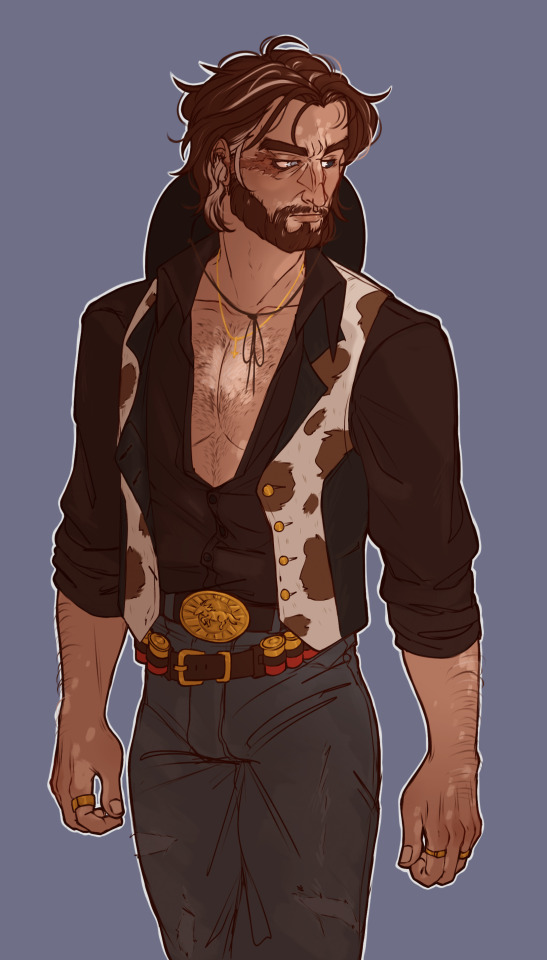

here's his playlist!! once again it's chronological so u can listen to his story like a fun yeehaw jukebox musical. i think his is my favorite of all my character playlists
alllll the teddy stuff (appearance, stats, story before the canon events of the game, fun facts) can be found under the cut!!! if you feel so inclined to read The Long Version written like a story where my longwinded ass spends about 7k words talking about themes and character motivations (and some soft gay longing perhaps), it's up on ao3 here.
appearance
41 years old; birthday may 3, 2240
6’6 with broad shoulders, generally built like a securitron.
patches of vitiligo splash across his face, chest, and arms
bennys bullet hit the right side of his face, carving a path from his eye to his ear, where a chunk of his ear is missing
because of this, he's blind in his right eye. the blind eye (a light, milky blue) is always a bit more closed than the seeing one (a dark, warm brown)
dark auburn chin-length hair and a short beard, both peppered with white because of his age and vitiligo. a big chunk of hair behind his ear is white as it grows from the scar.
he wears a horse or cow-skin vest with a great khans patch on the back
signature black cowboy hat, either on the top of his head or tied around his neck so it hangs down his back
gold jewelry - dangly cross earring in his left ear, upside down cross on a leather strap around his neck, big ass belt buckle
bright red shotgun shells on leather belt slung around his waist for his shotgun, dinner dell
stats
SPECIAL: 8, 1, 4, 5, 9, 2, 10
favorite perks: confirmed bachelor, animal friend, ferocious loyalty, intimidating presence
story
his dad was raised in utah and was very strictly mormon. when new jerusalem collapsed, dad moved himself, his wife, and his first son to the mojave and found work on an NCR sharecropper farm.
teddy was born fifth of six kids: four older brothers and one younger sister. he, his sister hannah, and his brother noah all have very visible vitiligo.
the kids were all also raised strictly mormon. his whole childhood, they were very poor. "at least we have each other" poor. his dad blamed it on the NCR, who owned the house and land and animals they ranched. they owned nothing, and the NCR paid them little more than that. teddy was quickly disillusioned with the NCR, then with the three of his brothers who decided to join them. one brother stayed back to inherit the ranch.
turns out, the NCR was paying; dad was just gambling it all away. he was so deeply in debt to all the families on the strip that they all decided to cut their losses and burn his farm to the ground.
that's... that's the story teddy decided to tell hannah, anyway (he wouldnt tell u this but he totally burnt that shit down on purpose). mom, dad, and one of his brothers were lost in the fire. teddy and hannah made it out, waved goodbye, parted ways.
teddy took his horse, old red, and began running jobs for whoever needed them. he never tied himself to one organization aaand his jobs weren't always above the ethical board. really, it was luck of the draw that, on any given day, he was the one defending the caravan instead of stealing from it
when he eventually went searching for his siblings, he found that two of the three brothers that had enlisted, predictably, were killed on duty. noah, though, had absconded almost immediately upon arrival due to a nasty chem habit
he found hannah "working" in front of gomorrah on the stip - her vitiligo made them instantly recognizable to each other - but she pretended not to know him because she was ashamed. he understood and gave up, but not before she hinted that he could find noah at the old mormon fort
he did, in fact, find noah there, medically detoxing under the care of some hot, blonde doctor (bweheheh....). they reconnected and it was..... really nice, even when they talked about how ashamed their dad would be if he could see them. it didnt matter. the family disappointments were the only family survivors.
teddy and arcade quickly grew very fond of each other, with arcade even being the first one to call him "teddy" after he told the doctor his name was theodore. he decided, despite its cutesy nature, to keep it.
after finishing his open jobs, teddy decided to stay with noah at the fort and run jobs for the followers when they needed it. he got reeeal comfy with arcade, and their subtle, playful flirtations eventually became noticeable to others. his brother, angry and sick from chem withdrawal and still fighting his religious upbringing, could not handle finding out that his baby brother was gay. when he did, he angrily shouted slurs and threw bottles at them until he was sedated and returned to bed.
teddy left the fort that night while everyone but the night watchman slept. he struggled to recover from what happened and drifted listlessly for a while... until he heard the news that noah had fled from his "rehab" program in the fort the day after teddy left, overdosed, and died.
the news spurred something in him, and he went looking for a real family and place to call home. after excelling in his initiation trials, he found one with the great khans. for two years, he was their resident rancher, runner, therapist, you name it.
then: 2278. the bitter springs massacre. teddy was away when it happened, and he still hasnt forgiven himself for it.
he spent the next three years drifting - again. hunting NCR. somehow racking up bounties in seemingly every single tribe in the mojave. his infamy, believe it or not, helped him survive: when he came across those who would kill him or turn him in, they seemed to prioritize who got to turn him in and collect the bounty over keeping themselves alive. whoops!
it was exhausting, though. drifting, killing, taking on the wasteland completely alone (except his beloved animals) took a heavy toll on teddy. he'd always been a killer and an outlaw, but he'd always been paid to clear other people's consciences. now, he felt he was only killing people to run from the consequences of his own actions. it was exhausting.
so, when three strangers – one in a loud, black-and-white checkered blazer – tried to knock him out and bind his hands, well… he had no reason not to let them.
*aint that a kick in the head starts blaring*
fun facts
hes not a big chem guy but hes such an alcoholic. in game he keeps at least 10 whiskeys on him at all times but would prefer to drink a sarsaparilla over using a stimpak.
he needs glasses pretty badly for his one seeing eye but he’s too stubborn to wear them
his scars always look a bit irritated because he doesnt take care of himself
he was a big pistol guy before benny shot him, but after he went blind in his aiming eye and started suffering from bouts of dizziness, he became a shotgunner. they require a far-from-perfect style of aiming
#BEHOLD: TEDDY#tw: religion#tw: overdose#not teddy but an important (non-canon) character#oc: teddy#fallout new vegas#new vegas oc#fallout oc#fnv oc#fnv courier#arcade gannon#courier three#followers of the apocalypse#courier 3
47 notes
·
View notes